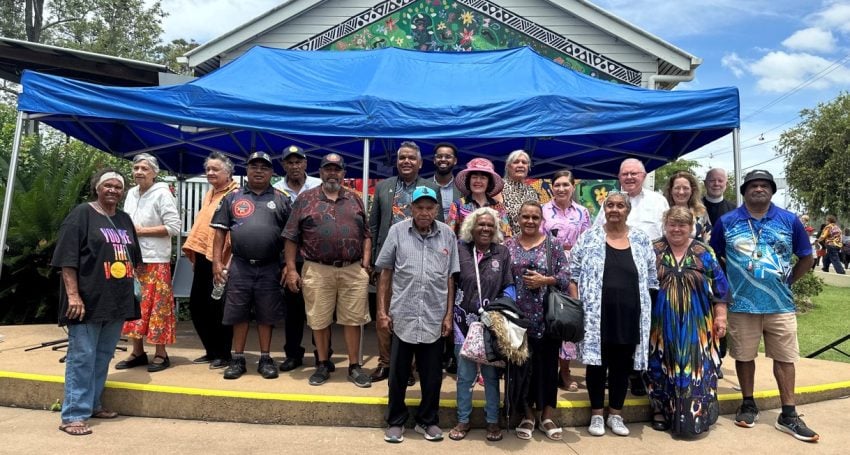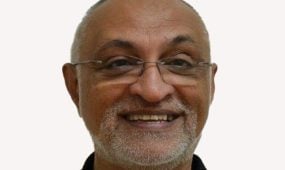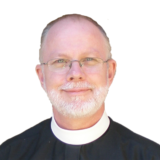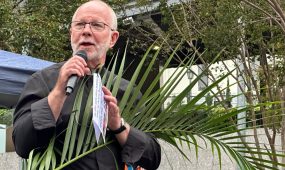"No wonder the writer of the Gospel according to John talks of the truth setting us free"
Reflections
“Monday’s event at Cherbourg had originally been organised as part of the Truth-telling and Healing Inquiry commissioned by the previous Queensland Government and cancelled by the current one. Given that the Inquiry had lined up 20 elders to tell their stories, the Cherbourg Aboriginal Shire Council decided to host the event so that those who had gone through the emotional process of preparing for the hearing could be honoured,” says The Very Rev’d Dr Peter Catt

“Truth never damages a cause that is just”
Mahatma Gandhi
I think victim impact statements are one of the most important changes made to the criminal justice system in recent times. In most Australian jurisdictions they have only been part of the process since the late 1980s or 1990s.
One of the benefits of victim impact statements is that they allow people who were not needed in a criminal trial, but were affected by the criminal act, to tell the story of how they were affected. So, for example, the parent of a murdered child can talk of their devastation even though they were not a witness to the murder. Victim impact statements also allow a direct victim, say of a rape, to talk about the lasting effects of the rape once the court has dealt with the evidence; a process that until then has focused on seeking to establish and test the facts. Victim impact statements ensure that the full story is appreciated and that people who were not given a voice in the trial are heard. They are important truth-telling and healing tools.
Advertisement
In more recent times there have been moves to add restorative justice practices to the mix of tools available to the courts for dealing with the perpetrators of criminal acts. An important part of any such process is bringing the perpetrator and survivor face to face so that for the perpetrator can hear first-hand about effects that their actions have had on the survivors. In many cases hearing such home truths transforms the life of the perpetrator. The encounter helps them change their ways in ways that more punitive methods do not. This is because the survivor is uniquely humanised for the perpetrator.
Many survivors speak of how healing and empowering they find the experience of being able to tell their story in a restorative justice session. They talk of the significance of having the truth of their lived experience honoured and validated by having the person who caused them injury listening to them, hearing them and believing them.
Those who contributed to the work of The Truth and Reconciliation Commission set up by Nelson Mandela and chaired by Archbishop Despond Tutu in post-apartheid South Africa also speak of the healing to be found in being able to tell their story and have that story honoured as true.
Advertisement
On Monday I spent the morning with several hundred others at the Cherbourg Ration Shed Museum listening to a number of people tell their stories about what it was like to live under the Aboriginals Protection and Restriction of the Sale of Opium Act 1897. The Act ensured that the lives of Aboriginal people were tightly controlled and disrupted the lives of many families.
Monday’s event at Cherbourg had originally been organised as part of the Truth-telling and Healing Inquiry commissioned by the previous Queensland Government and cancelled by the current one.
Given that the Inquiry had lined up 20 elders to tell their stories, the Cherbourg Aboriginal Shire Council decided to host the event so that those who had gone through the emotional process of preparing for the hearing could be honoured.
It was a huge and humbling privilege to be part of the process. Over the course of two hours those who wished, quietly told us personal stories of life under The Act. Without exception they thanked us for listening and most talked of the positive effect of being listened to.
Related Story
 Local
Local
Statement in support of the Truth-Telling and Healing Inquiry — Queensland Muslims Inc.
The session ended with a shared meal and the deepening of relationships through time spent together.
The world shifted a little as we took this tiny step towards healing through truth-telling.
No wonder the writer of the Gospel according to John talks of the truth setting us free.
Editor’s note: If you are in immediate danger, phone Triple Zero (000) or go to the emergency department at your local hospital.
If you have recently experienced sexual assault, rape or sexual violence, get yourself to a safe place as soon as possible and:
- phone the police and/or ambulance on Triple Zero (000)
- go to the emergency department at your local hospital
- phone the Sexual Assault Helpline on 1800 010 120 (7.30am to 11.30pm, 7 days a week).
Please visit the Queensland Government website for more information.






